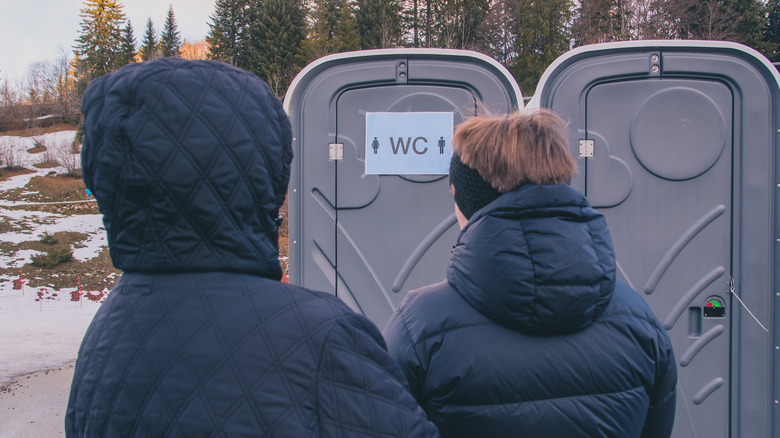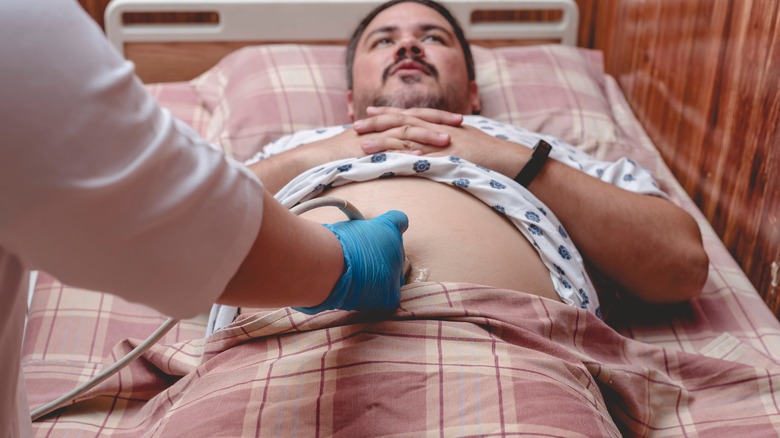When You Hold Your Pee, This Is What Happens To Your Body
However urgent it may be, we can't always answer a call of nature when it happens. We may be driving, in a meeting, or, in the worst-case scenario, a bathroom may not be readily accessible. Whatever the case may be, sometimes we just have to hold our urine in. Luckily, for the most part, the bladder can handle it. On average, your bladder can hold around 500 milliliters (16 ounces) of urine (via HealthDirect). Generally, however, your body will let you know when it's time to go when the bladder gets about half full or so.
If your bladder is healthy, it can stretch to accommodate larger amounts of urine for a certain time (via Piedmont Healthcare). However, it's recommended that you empty your bladder every three hours, even if you don't feel the urge to go. Retaining too much urine in your bladder or holding your pee in can have serious health consequences.
Your bladder wall can thicken
Holding in your urine for too long could cause the walls of your bladder to thicken, which can impact the flow of urine into the bladder (via Sharp Health News). According to WebMD, thickening of the bladder wall is called bladder trabeculation, and it can make the walls more difficult to expand and contract. This will make it much more challenging to fully empty your bladder.
If you have a trabeculated bladder, you can experience a number of symptoms, including trouble urinating, kidney pain, painful urination, and the feeling that you have not fully evacuated (via Medical News Today). Depending on the cause, your doctor may recommend medications or procedures to manage it. In some cases, surgical intervention may be necessary. Treatment can be successful, but it can be difficult to regain elasticity once the bladder has begun to lose it. As such, catching it early is important.
You could develop a urinary tract infection
Taking too long between bathroom breaks can cause bacteria in your bladder to settle and, over time, multiply. Too much bacteria can lead to your developing a urinary tract infection, or UTI (via Regency Health). According to a 2013 study published in Sultan Qaboos University Medical Journal, most UTIs are caused by the bacteria Escherichia coli. The study also noted the frequency of bacterial UTIs in women, with 50% to 60% of women reporting at least one UTI within their lifetimes.
If you are suffering from a urinary tract infection, you will most likely experience pain and a burning sensation while urinating (via the Urology Care Foundation). In addition, you may feel the need to urinate but only manage to squeeze out a small amount. The urge is a result of irritations to the bladder lining, creating the feeling that you have to urinate even when the bladder itself is fairly empty. If you're able to catch a UTI early, a course of antibiotics should clear it up quickly. If it's more serious, you may have to undergo IV antibiotics.
Your bladder could stretch
As your bladder fills up, it stretches to accommodate the excess urine (via Kauvery Hospital). After you've taken care of business, everything returns to normal. But if you hold on to your urine for too long, it becomes harder and harder for your bladder to snap back. If you hold it in long enough, your bladder might stay stretched out. If things become too severe, you may even require a catheter in order to properly empty the bladder.
The Cleveland Clinic notes that bladder distention can cause a number of issues related to bathroom use. These include unwanted urine leakage, a feeling of urgently needing to urinate, even when you don't have to go, and not being able to fully evacuate. Urine leaking and urgency can also be signs that you have a distended bladder. If you have these symptoms, or are unable to urinate and are experiencing pain, you should seek emergency medical treatment right away.
You could damage your pelvic floor
It may sound strange, but waiting too long between pees could actually impact your pelvic floor. These are the muscles that support organs like your bladder, large intestine, and internal reproductive system (via Cleveland Clinic). They also play a role in the functions of your bladder and bowels and can keep your spine protected when you're doing strenuous activities like lifting.
The Cleveland Clinic notes that the pelvic floor muscles are important in removing waste from your body. The muscles contract to hold waste inside your body and relax to help move processes like urination and defecation along properly. If you hold in your pee too much, you start putting stress on those muscles, which can lead to problems (via Pelvis NYC). If those muscles get too weak, you could be looking at a host of urinary issues, including, but not limited to, incontinence.
You could form kidney stones
When urine sits for too long in your bladder, the minerals, salts, and proteins in your urine run the risk of crystallizing (via Apollo 24/7). This crystallized urine can then form kidney stones. Kidney stones can be very painful, but they can also become trapped in your urinary tract, which can make urinating difficult and create a host of other problems with your kidneys.
According to Penn Medicine, you may not realize that you have stones until they pass from the kidney into the bladder. This process is usually accompanied by a significant amount of pain that is usually felt in the back or belly and can move to the groin. You may also experience blood in your urine, fever, chills, or urine color that is abnormal. If the stone is small enough, it should pass out on its own through your urine. If it is too large to pass on its own, you may need surgery to break the stone up so that it can pass through the urine easily.
You can wet the bed
According to a 2019 study published in the Canadian Urological Association Journal, up to 3% of adults experience nocturnal enuresis, or bedwetting. There are a number of reasons for this, including certain medications, sleep apnea, obesity, and hypertension. However, Sharp Healthcare reports that holding in your urine when you have the urge to go can lead to bedwetting, both in adults and children.
If you are suffering from nocturnal enuresis, there are a few things you can do to try and manage the condition (via Cleveland Clinic). Changes in your behavior, such as setting an alarm, can be a good start. You can also make sure that you void your bladder regularly during the day and right before bed. You should also be careful about how much you drink before bedtime. Surgery may be necessary in some cases if these methods don't work. You should consult your healthcare provider if your bedwetting is unable to be managed conventionally.
Your kidneys could swell
Retaining urine too long could lead to a condition known as hydronephrosis, which is a swelling of the kidneys, according to the Mayo Clinic. This happens when urine backs up into the kidneys, which leads to swelling. If it's left untreated, you could be looking at serious and possibly permanent kidney damage. In the worst-case scenario, you could also face kidney failure, although that is very rare.
Hydronephrosis can be very painful and can also present with blood in the urine, urinary tract infections, or a fever (via MedicineNet). If you experience any of these symptoms, you should seek medical care immediately. Your doctor will most likely order tests to determine if your symptoms are related to swollen kidneys or not. If your hydronephrosis is caused by urine retention, your doctor will probably recommend catheterization in order to drain the bladder. In more serious cases, you may have to have what is called a percutaneous nephrostomy tube inserted. This is a tube inserted directly into the kidney to assist in drainage.
Your bladder could rupture
While holding in your pee is not necessarily a life-threatening problem, in some cases, you could be doing more damage than you realize. According to Vinmec Healthcare System, holding in your pee too long can, over time, stretch the bladder muscles irreversibly. If the bladder muscles are stretched too far and lose their ability to contract, the bladder itself can rupture. If this happens, it can be a serious, even deadly, problem.
A 2018 study published in Urology Case Reports covered a case of a 23-year-old male whose bladder ruptured spontaneously due to urinary retention. Although he had been in a car accident two years prior, he had no other history of urethral trauma or catheterization. The patient reported experiencing problems urinating and increasing pain in the abdomen. The rupture required laparoscopic surgery to repair the bladder wall and a catheter to help drain the bladder.
You could be in serious pain
Anyone who has desperately had to go to the bathroom knows that the urge to urinate can be a very painful experience. However, that pain can multiply exponentially if you feel the urge to go and ignore it for too long. According to Lake City Physical Therapy, holding in your urine can mess with the balance of the organs, nerves, and muscles in your pelvis. One of the outcomes of that disruption of balance is something called interstitial cystitis, or bladder pain syndrome.
Interstitial cystitis, or IC, is a very painful condition marked by pressure and pain in the bladder and pelvic region (via Penn Medicine). In addition to experiencing pain, people who suffer from IC can feel a frequent urge to urinate, sometimes occurring up to 60 times a day. There is no cure for the condition, but it can be managed via medication, as well as changes to your diet and lifestyle. Surgery can be required in serious cases, although it is rare. Check with your healthcare provider if you think you're experiencing IC symptoms.










